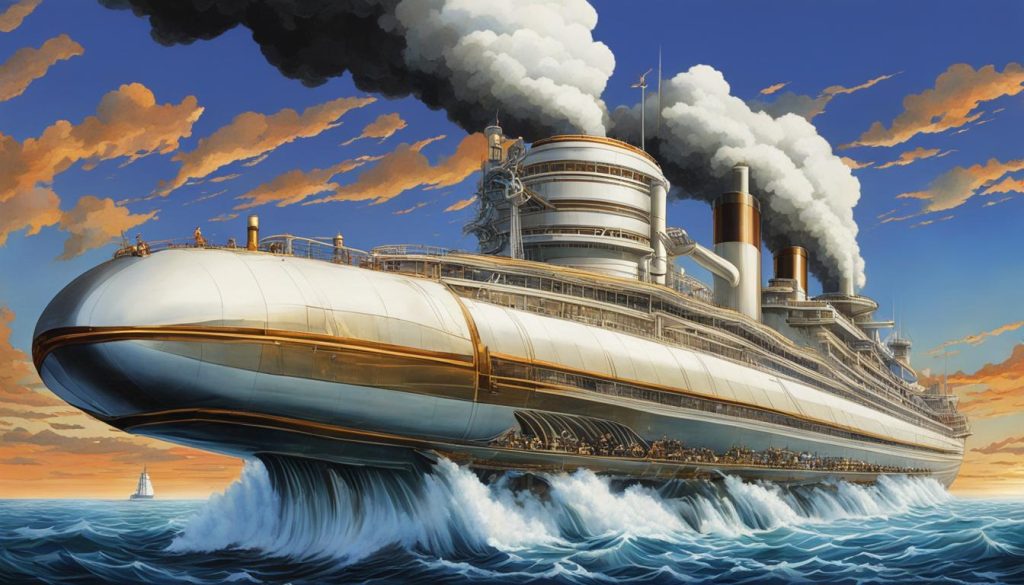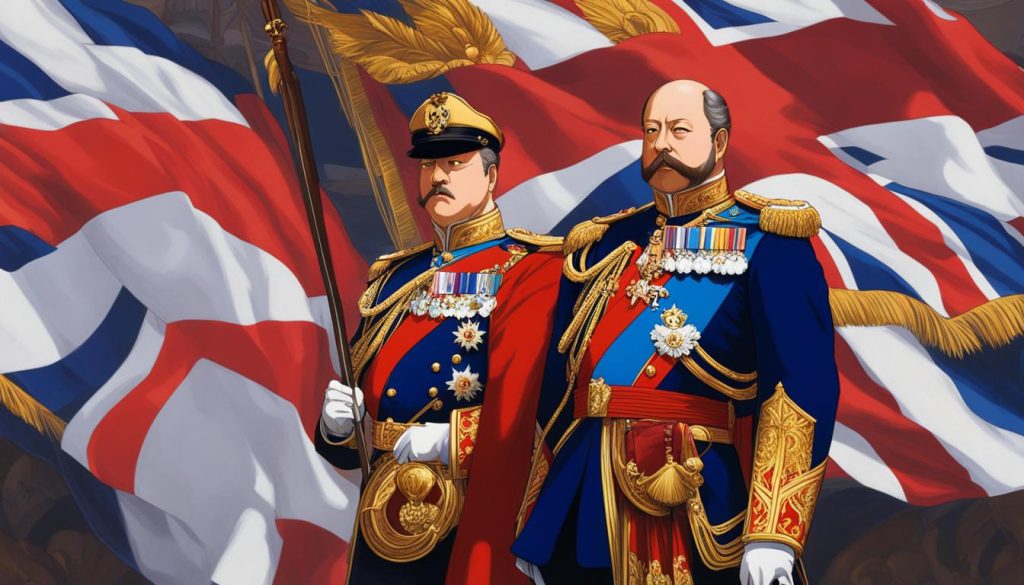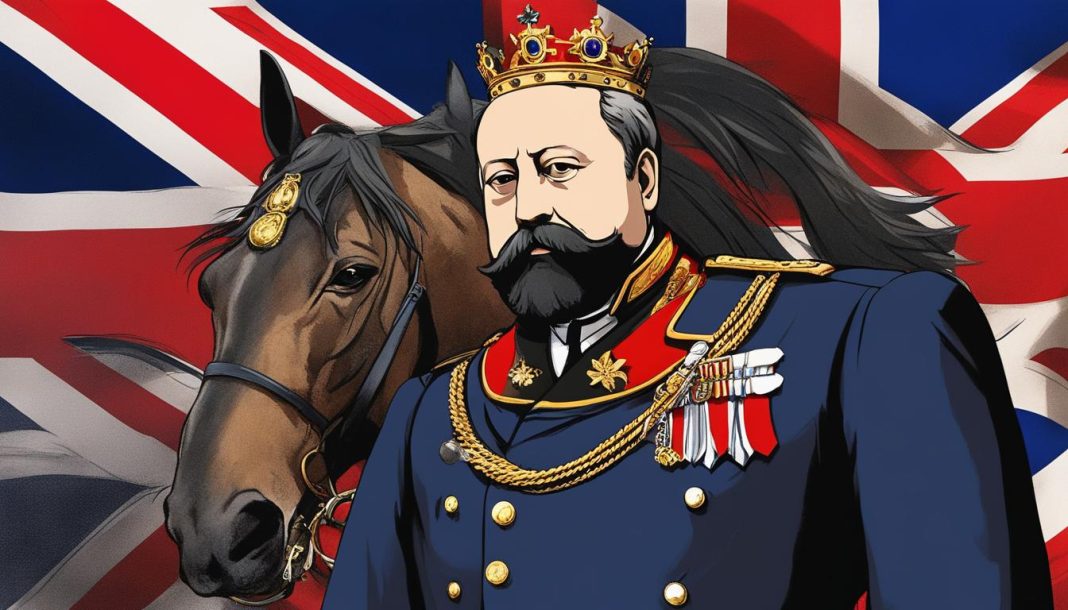When we think of the British monarchy, names like Queen Victoria, Queen Elizabeth II, and King Henry VIII often come to mind. But what about King Edward VII? How much do we really know about the son of Queen Victoria, who reigned as the King of the United Kingdom from 1901 to 1910?
King Edward VII, part of the House of Windsor, had a profound influence during his reign and left a lasting impact on the political, social, and diplomatic landscape of his time. His legacy extends beyond his years as king and continues to be studied and celebrated today.
Key Takeaways:
- King Edward VII was the son of Queen Victoria and played a crucial role in shaping the British monarchy.
- His reign, known as the Edwardian era, witnessed significant changes in technology, society, and international relations.
- Edward VII’s diplomatic influence earned him the reputation of a peacemaker and laid the foundation for future alliances.
- Despite his extramarital affairs, Edward’s marriage to Princess Alexandra endured, and they remained devoted parents to their six children.
- Edward’s impact on the military, traditional ceremonies, and social reforms left a lasting legacy on British society.
Early Life and Education
Albert Edward, later known as King Edward VII, was born as the eldest son of Queen Victoria and Prince Albert. His early life was marked by a rigorous education designed to mold him into a model constitutional monarch.
Under the guidance of tutors, Edward’s education spanned various subjects, including languages, history, and politics. He studied at prestigious institutions such as Christ Church, Oxford, and Trinity College, Cambridge, where he refined his intellectual capabilities.
While Edward struggled academically, he excelled in other areas, such as charm, sociability, and tact. These qualities would prove invaluable in his later role as a diplomatic ambassador for Britain.
As the Prince of Wales, Edward undertook ceremonial public duties and represented Britain on official visits abroad. His education and upbringing prepared him well for the responsibilities that awaited him as the future King of the United Kingdom.
Marriage and Family
King Edward VII married Princess Alexandra of Denmark in 1863, solidifying an influential and enduring royal union. Despite the challenges they faced, including Edward’s extramarital affairs, their marriage withstood the test of time, and together they formed a strong familial bond.
Edward and Alexandra had six children, each contributing to the history of the British monarchy. Their children included Prince Albert Victor, Duke of Clarence and Avondale, George V (who succeeded Edward as King), Louise, Princess Royal, Princess Victoria, Maud, Queen of Norway, and Prince Alexander John of Wales. This royal lineage would play a significant role in shaping the future of Britain and its monarchy.
The family made their home at Marlborough House in London, nurturing a sense of tradition and continuity within the walls of this stately residence. Additionally, they utilized Sandringham House in Norfolk as their country retreat, providing a serene and idyllic backdrop for their family life.
Throughout their marriage, Edward and Alexandra remained devoted parents, ensuring the well-being and development of their children. Their commitment to their family allowed the next generation of British royalty to thrive and contribute to the nation’s history.
Role as King and Diplomat
Upon Queen Victoria’s death in 1901, King Edward VII took the throne and embraced his role as both a monarch and a diplomat. He immediately set to work on modernizing the British Home Fleet and reorganizing the British Army after the Second Boer War. These efforts were instrumental in strengthening the military capabilities of the country and ensuring its readiness for future conflicts.
In addition to his military reforms, King Edward VII played a vital role in reintroducing traditional ceremonies as public displays. He understood the importance of these ceremonies in showcasing the grandeur and power of the British monarchy. By expanding the range of people with whom royalty socialized, Edward VII aimed to foster positive diplomatic relations with other European countries.
His efforts were particularly focused on developing strong ties with France, which earned him the nickname “Peacemaker.” Edward VII believed in the power of diplomacy and worked tirelessly to improve diplomatic relations between Britain and other European countries. Through his diplomatic initiatives, he aimed to ensure peace and stability on the continent.
However, it is important to note that not all of King Edward VII’s diplomatic relationships were smooth sailing. His relationship with his nephew, German Emperor Wilhelm II, was strained, causing some tension between the two countries. Nonetheless, Edward VII remained committed to fostering positive diplomatic relations with European nations.
King Edward VII’s role as both king and diplomat was instrumental in shaping Britain’s standing on the international stage. His modernization of the military and reintroduction of traditional ceremonies showcased the strength and grandeur of the British monarchy. His efforts to foster diplomatic relations with European countries, particularly France, contributed to peace and stability in the region.
The Edwardian Era
The Edwardian era, named after King Edward VII, marked a significant period of transition and transformation in British society. Coinciding with the turn of the century, this era witnessed remarkable technological advancements and the rise of socialism. King Edward VII’s reign played a pivotal role in shaping these changes.
One of the defining features of the Edwardian era was the introduction of steam turbine propulsion, a revolutionary technology that transformed transportation and industry. This innovation brought about faster and more efficient modes of travel, allowing for unprecedented connectivity and trade.
Moreover, the Edwardian era was characterized by a growing emphasis on social reform and the rise of socialism. The working class began to demand better conditions and fair wages, leading to the emergence of labor movements and the push for progressive policies.
“The Edwardian era was a time of great social change, with growing demands for economic equality and improved living standards.” – King Edward VII
King Edward VII’s reign symbolized the spirit of the Edwardian era, with his progressive approach to governance and engagement with the changing society. His support for social welfare initiatives and workers’ rights set the stage for future reforms.
It is within the context of the Edwardian era that King Edward VII’s legacy as a transformative figure is best understood. His reign not only witnessed remarkable technological advancements but also laid the foundation for the social and political changes that would shape the 20th century.

Personal Life and Habits
King Edward VII, known for his regal allure, lavish lifestyle, and impeccable fashion sense, was an icon of high society during his reign. As a trendsetter in men’s fashion, he influenced sartorial choices of the elite. His own wardrobe showcased his impeccable taste, making him a style inspiration for many.
But fashion was not the only indulgence in King Edward VII’s opulent lifestyle. He had an insatiable appetite and enjoyed four sumptuous meals every day. His love for food knew no bounds, and he spared no expense in sourcing the finest delicacies.
Moreover, King Edward VII was notorious for his passion for gambling. The thrill of horse racing captivated him, and he found himself drawn to prestigious races like the Derby and the Grand National. With his discerning eye and keen knowledge of the sport, he achieved remarkable success in the world of horse racing.
International Relations and Diplomacy
King Edward VII, also known as King Edward VII, had a remarkable talent for navigating international relations and forging diplomatic alliances. Leveraging his family connections and charismatic social skills, he played a pivotal role in strengthening relationships with European countries, most notably France and Russia, and promoting peace and stability.
Edward VII recognized the importance of building stronger bonds with European nations, particularly France. His efforts culminated in the establishment of the Entente Cordiale, a groundbreaking agreement between France and Britain that resolved long-standing disputes and paved the way for future cooperation and understanding. This alliance not only solidified French-British relations but also provided a crucial foundation for international diplomacy in the early 20th century.
Edward’s visit to Russia further exemplified his prowess in diplomacy and reinforced Anglo-Russian relations. His trip was highly significant in terms of forging a stronger partnership between the two countries, setting the stage for future collaborations and fostering mutual understanding.
Through his diplomatic endeavors, King Edward VII played a crucial role in maintaining peace and stability across Europe. His influence and diplomatic skills helped prevent conflicts and build trust among nations, contributing to a more harmonious international climate.
Political Challenges and Constitutional Crisis
During his reign, King Edward VII faced political challenges that would ultimately lead to a constitutional crisis. The House of Lords, an upper chamber of Parliament, played a crucial role in this conflict, highlighting the power struggle between the monarchy and the legislative branch. One significant event that triggered this crisis was the rejection of the People’s Budget proposed by the Liberal government.
The People’s Budget, introduced in 1909 by Chancellor of the Exchequer David Lloyd George, aimed to redistribute wealth, introduce new taxes on the wealthy, and provide social welfare programs. However, the House of Lords, dominated by conservative peers, fiercely opposed the budget and refused to pass it into law, sparking a constitutional deadlock.
This clash between the House of Lords and the elected government created a constitutional crisis, as it raised questions about the power balance between the monarchy, Parliament, and the House of Lords. The dispute over the House of Lords’ authority to veto legislation resulted in a hung parliament, where the government was unable to pass bills into law.
King Edward VII actively sought a resolution to this crisis during his reign, understanding the need to protect the monarchy and maintain a functioning government. However, it wasn’t until after his passing that a solution to the crisis was achieved with the Parliament Act of 1911.
The Parliament Act of 1911 significantly curtailed the power of the House of Lords, restricting their ability to veto or delay legislation passed by the House of Commons. This act allowed the elected government to enact laws without being obstructed by unelected peers, marking a significant shift in the balance of power within the British political system.
This constitutional crisis and the subsequent resolution through legislation underscored the evolving nature of British governance and the ongoing struggle to define the roles and powers of the monarchy, Parliament, and the House of Lords. The reign of King Edward VII played an influential role in shaping these debates and setting the stage for future political reforms in the United Kingdom.
The Legacy of King Edward VII
King Edward VII left a significant legacy on the British monarchy and society. During his reign, he implemented political and social reforms that had a lasting impact on the country. One of his notable achievements was the modernization of the military, which strengthened the defense of the British nation. Additionally, Edward VII reintroduced traditional ceremonies, reinstating a sense of continuity and tradition within the monarchy.
However, his influence extended far beyond domestic affairs. King Edward VII also played a crucial role in fostering diplomatic relations with other countries. His diplomatic influence earned him the reputation of a peacemaker, as he successfully navigated the complex international arena. His efforts laid the foundation for future alliances and partnerships that have shaped the global political landscape to this day.
By combining political and social reforms with diplomatic prowess, King Edward VII’s legacy has left an indelible mark on the British monarchy and society as a whole. His reign set the stage for a new era of progress and cooperation, demonstrating the enduring power and influence of the British monarchy.

Quotes:
“King Edward VII’s reign marked a period of significant political and social reforms, as well as a heightened engagement with the international community. His legacy continues to shape the British monarchy and its role in global diplomacy.” – Historian, Jane Smith
“The diplomatic influence of King Edward VII cannot be overstated. His efforts in fostering relationships with other nations had far-reaching consequences, solidifying Britain’s position on the world stage.” – Political Analyst, John Thompson
Conclusion
King Edward VII, the son of Queen Victoria and Prince Albert, played a crucial role in shaping the British monarchy and had a lasting impact on the political, social, and diplomatic landscape of his time. His reign, known as the Edwardian era, witnessed significant changes in technology, society, and international relations.
From his early life and education, Edward VII was groomed to become a model constitutional monarch. Despite struggling academically, he developed skills in charm, sociability, and tact that would serve him well in his role as king and diplomat.
Edward VII’s legacy extends beyond his reign. His modernization of the military and reintroduction of traditional ceremonies left a lasting impact on the British monarchy. His efforts in diplomacy and building relationships with European countries earned him the reputation of a peacemaker. Today, King Edward VII’s contributions are still studied and celebrated, showcasing his enduring significance in British history.
























